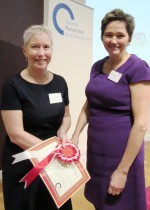 |
Provocation, innovation and eternal truthsScottish Partnership for Palliative Care Annual ConferenceWednesday 18th September 2019, Royal College of Physicians EdinburghFeaturing a mix of high quality speakers, extensive poster display, arts space and delegate interaction the SPPC annual conference will provide delegates with:
Download the conference programme here: Conference Programme Book a place here: Bookings and prices Check out the conference webpage here: SPPC Annual Conference 2019 Read on to find out more about the programme for the day... |
Ask not what we can do for death, but what death can do for us |
Heather Richardson, Joint Chief Executive, St Christopher's Hospice Jake Garber, Service Designer and Systems Thinker, WIGS As a sector, we hold a powerful position within the national consciousness as the practical and symbolic carers of the dying. So far we have struggled to leverage this position to create the changes that are needed in the sector and in wider society. Research on ‘framing’ highlights how familiar patterns of communication and action are maintained, suggesting one way in which progress is blocked. So what if we start with the frame that death is the opportunity? What becomes possible then? |
What’s the best way to care? |
Tony Walter, Sociologist and Emeritus Professor, Centre for Death & Society, University of Bath At end of life, what is the role of bio-medicine and institutions such as hospitals and care homes? Are critiques of medicalisation and institutional care overplayed? Do palliative care and compassionate community have all the answers? |
Building organisations which sustain rather than damage employee well-being |
Michael West, Professor of Organisational Psychology, Lancaster University Management School Drawing on research, practical examples and his co-chairing of the current GMC review of doctors’ mental health and wellbeing, Michael will describe ways in which organisations can respond to current pressures without sacrificing the wellbeing of employees. |
To be Professional is to be Human: attending to our soul in palliative care provision |
Ewan Kelly, Freelance Facilitator, Speaker and Pastoral Supervisor This session will explore the significance of meaningful work for our wellbeing as people as well as practitioners, including how we respond when our deep desire to provide the right care is in tension with aspects of our work context. Ewan will share thoughts, practical strategies and lead a gentle reflection to close the day. |
Breakout Sessions |
Delegates can choose to attend one of the following breakout sessions: Safe, practical radical – how design can help you rethink approaches to death, dying and care.Jake Garber, Service Designer and Systems Thinker, WIGS This workshop will show how design thinking can be used to frame new approaches to knotty problems. Delegates will have an opportunity to prototype a solution to an issue which concerns them. How can we best enable carers to express their support needs and work with them to provide the right support?Dr Gail Ewing, Senior Research Associate, University of Cambridge Lynne Carmichael, Head of Clinical Governance and Practice Development. This interactive and practical workshop will introduce the Carer Support Needs Assessment Tool (CSNAT) intervention. Delegates will gain an understanding of its approach and use in practice. Realistic Medicine works in Palliative CareDr Kirsty Boyd, Consultant in Palliative Medicine, NHS Lothian and Dr Kim Steel, Consultant in Palliative Medicine, NHS Fife. Realistic Medicine is driving changes to policy and practice across Scotland and overlaps with another key aspect of palliative care – anticipatory care planning. This session will use case-based discussion, Q&A and interactive communication to look at what realistic medicine brings to palliative care practice and how palliative care professionals can support the delivery of realistic medicine principles in Scotland. How translational research can directly impact on the palliative care delivered to our patients:examples in bone and neuropathic pain.Prof Marie Fallon, St Columba’s Hospice Chair of Palliative Medicine at the University of Edinburgh and Honorary Consultant in Palliative Care at the Western General Hospital in Edinburgh. |
Call for Posters |
Are you involved in an interesting project or in an area of work that you would like to discuss with or show to others in Scotland with an interest in palliative care? Why not apply to display a poster of your work at this year's SPPC Annual Conference? The annual poster exhibition is an essential part of learning and sharing best practice at the conference. Last year's exhibition showcased a record 48 posters, sharing a variety of work from across Scotland. If you are interested in presenting a poster to be part of the exhibition, please contact: Pauline@palliativecarescotland.org.uk for a proposal form for completion. The deadline for receipt of applications is Monday 2nd September. Those bringing a poster to the conference should also be prepared to give a brief 5 minute presentation on their poster should it win the People’s Poster Vote on the day. Find out more here: Call for Posters. |
Book now |
The conference costs £150, with a reduced rate for £110 for employees of member organisations. (A list of member organisations is available here: SPPC members.) To book a place, click here: Bookings and prices Download the conference programme here: Conference Programme Check out the conference webpage here: SPPC Annual Conference 2019 |
|
If someone forwarded you this email, you can sign up for your own copy here. If you have any questions or comments, you can email us or phone 0131 272 2735. |







